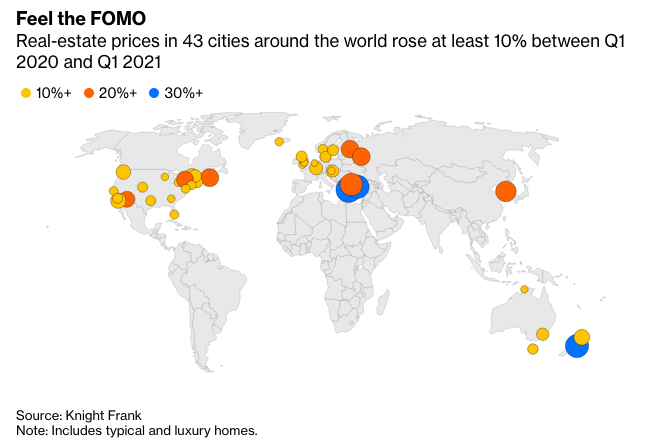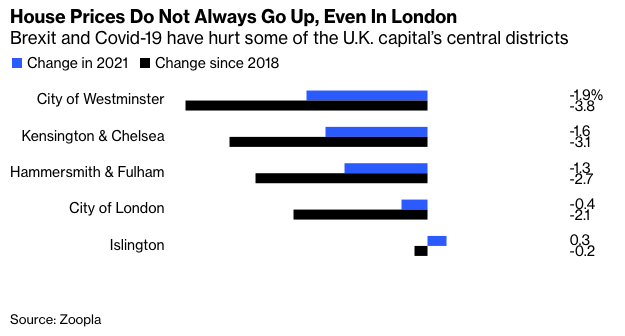Here’s a word to add to your investing vocabulary: Dungers. The term for dilapidated, crumbling houses comes from New Zealand, which is in the grip of a striking property boom. The country topped Bloomberg Economics’ risk radar in June for being the most unaffordable housing market in the world. Judging by the dunger that sold for NZ$1.8 million ($1.3 million) in January, quality is no obstacle—and neither is price.
It’s something that policymakers everywhere should watch closely. Not because New Zealand is a systemic risk, but because property markets are running hot around the world in similar ways. What began as a stimulus-fueled search for a better quality of life has morphed into a frenzy driven by a Fear of Missing Out (FOMO) that can boomerang on buyers when excitement cools, all while making housing less affordable.
Some kind of pandemic-related property rebound was to be expected. A genuine economic recovery is underway, driven by $5.4 trillion of extra savings worldwide. Aspiring “upsizers” are searching for space as well as long-term financial investments, especially among aging millennials who see a shot at outpacing rich boomer forebears. Real estate consultant Knight Frank’s global price tracker shows 128 out of 150 cities saw prices rise year-on-year in the first quarter of 2021, with 43 growing at double-digit rates—more than twice the amount in the previous year.

But there’s also pent-up speculative enthusiasm, even desperation, as millennials jump on the housing ladder after what feels like years of missed opportunity. The combined result is prices going beyond the historical average of what buyers would be able to afford (and be willing to pay). Bloomberg Economics estimates 20 property markets including the U.S., U.K., France, Germany and Switzerland are above their long-run price average relative to rents, or buyers’ income, or both.
Egregious tales of excess compiled by my Bloomberg News colleagues include bidding wars over semi-derelict homes in Australia and prospective buyers in Shenzhen being asked to transfer 1 million yuan ($154,706) and submit personal credit reports before being able to bid.
New Zealand is a fitting poster child for what’s going on, rather than a densely populated global megacity like New York or Hong Kong. The island country’s isolation and record fighting Covid-19 have attracted Silicon Valley preppers and domestic investors alike, with one woman buying five homes in one year. Even after restrictions on property speculation introduced by Prime Minister Jacinda Ardern’s government, the less wealthy are racing to keep up. Those who’ve failed to get on the property ladder feel ashamed. “People say we’ve missed the boat,” one said.
Talk of missed boats is ironic when looking at what’s happening inside some of the beneficiaries of the last big property boom, the “safe haven” city centers. Prices for pockets of prime real estate in global cities such as London, Hong Kong and New York have fallen, in contrast with roomier properties further out. (It’s a reminder that prices don’t always rise, and disruptors from climate change to political change can hurt.)
In London, the impact of Brexit was visible well before the pandemic: Zoopla price data by borough shows some of the city’s most central districts have fallen in price since 2017-18. That said, after decades of gains, these cities are still far from affordable to the average buyer.









